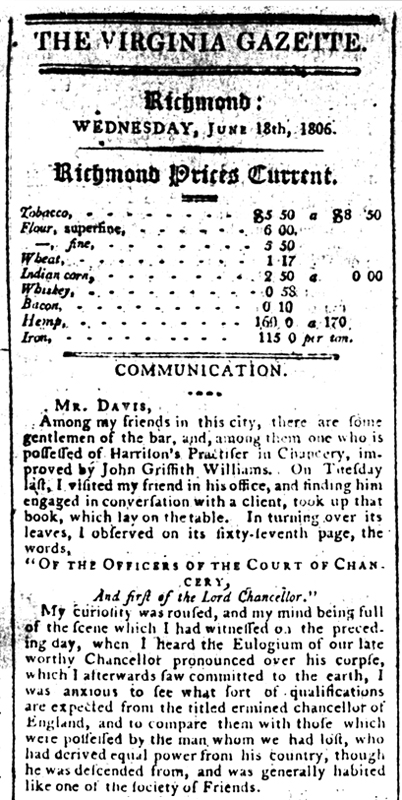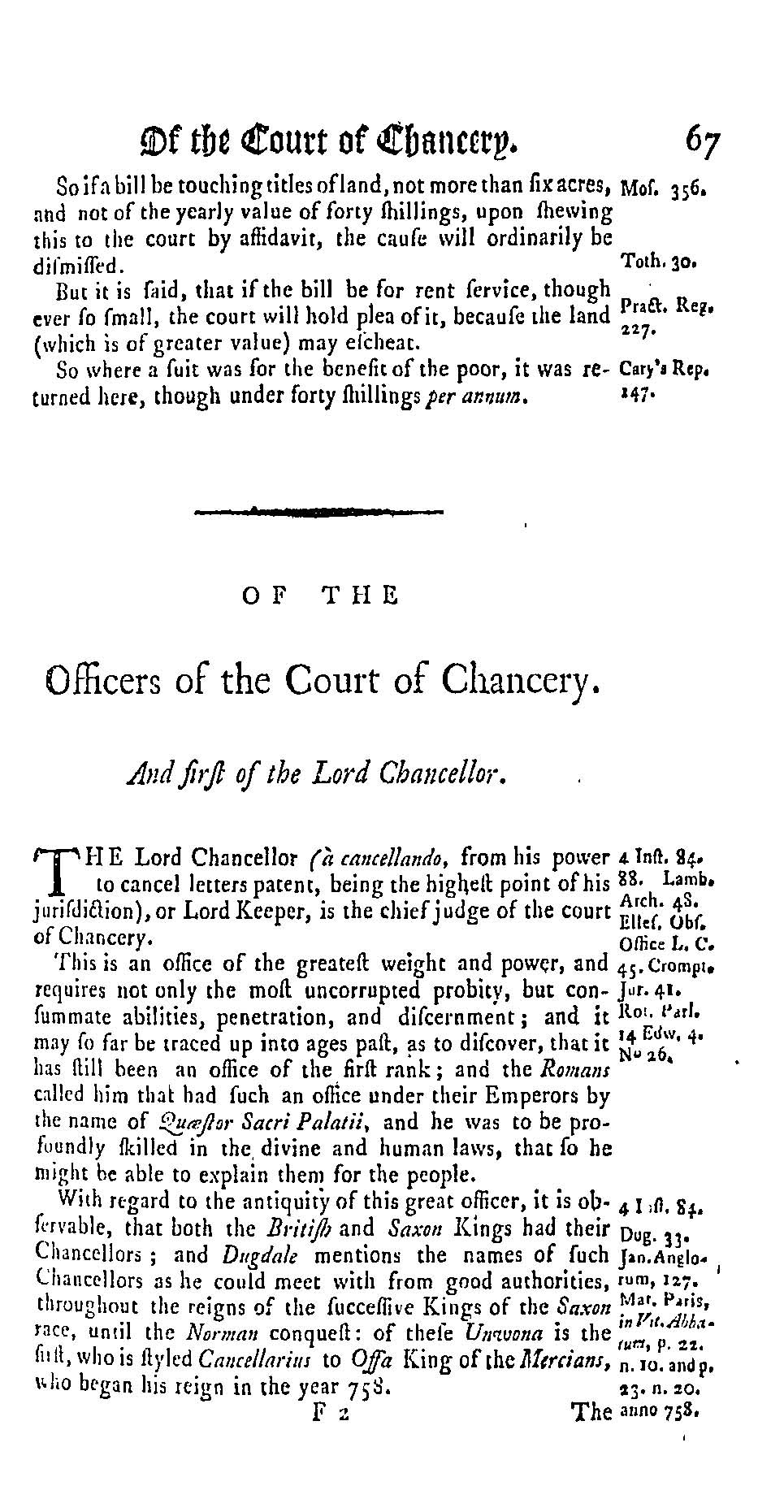Virginia Gazette, and General Advertiser, 18 June 1806

Ten days after George Wythe's death, a "Communication" appeared in the pages of Richmond's Virginia Gazette, and General Advertiser, addressing Augustine Davis, the paper's publisher.[1] The article is a lament upon the loss of a such a fair man and equitable judge. The author goes to great lengths to illustrate Wythe's self-education and his "intimate acquaintance with the laws and morals of men," and states that Wythe possessed wisdom from both classical authors and contemporary philosophers, from Epictetus to Adam Smith. Many works by the authors mentioned can be found in the Wolf Law Library's George Wythe Collection.
The article is signed with the initials "A.B.," but the identity of the author remains unknown. From the statements that they "knew George Wythe at the bar," and "often visited the House of Burgesses when he was its clerk," it can be inferred that the author was a Virginia attorney, local to Williamsburg. As a first-hand description of Wythe, it is more reliable than Parson Weem's anecdote, "The Honest Lawyer."
Article text, 18 June 1806
Page 3
COMMUNICATION
• • • •MR. DAVIS,
Among my friends in this city, there are some gentlemen of the bar, and, among them one who is possessed of Harrison's Practiser in Chancery, improved by John Griffith Williams.[2] On Tuesday last, I visited my friend in his office, and finding him engaged in conversation with a client, took up that book, which lay on the table. In turning over its leaves, I observed on its sixty-seventh page, the words,
"OF THE OFFICERS OF THE COURT OF CHANCERY,
And first of the Lord Chancellor."My curiousity was roused, and m mind being full of the scene which I had witnessed on the preceding day, when I heard the Eulogium of our late worthy Chancellor pronounced over his corpse, which I afterwards saw committed to the earth, I was anxious to see what sort of qualifications are expected from the titled ermined chancellor of England, and to compare them with those which were possessed by the man whom we had lost, who had derived equal power from his country, though he was descended from, and was generally habited like one of the society of Friends.

'On Tuesday last, I visited my friend in his office, and finding him engaged in conversation with a client, took up that book, which lay on the table. In turning over its leaves, I observed on its sixty-seventh page, the words, "OF THE OFFICERS OF THE COURT OF CHANCERY, / And first of the Lord Chancellor."'
Found in Harrison and Williams' The Accomplish'd Practiser in the High Court of Chancery (1790).
I began to read, I soon found these words, "This is an office of the greatest weight and power, and requires, not only the most uncorrupted probity; but consummate abilities, penetration, and discernment." I paused a while and then read on; and in the next page, I found the words, "He judgeth according to Equity, moderating the rigour of the common law, and governing his judgment by the law of nature, and conscience, ordering all things Juxta æquum et bonum."[3] I exclaimed good God I have lost! Surely the writer must have been in Virginia ten or a dozen years ago, and taken the picture of what an English Lord Chancellor ought to [be] from what George Wythe, descended from and habited like one of the society of Friends, really [was]! The orator ought to have brought these sentences together, and only said after the first, such "George Wythe was," and after the second, "so he judged." My friend and his client stood astonished and enquired into the cause of my sudden agitation. I read the sentences, one after the other, my friend calmly said, "you are correct." His client who had heard some late rumours concerning Mr. Wythe's abberations from the rule in the second sentence, required an explanation. Cured of my momentary phrenzy, I explained thus:
I knew George Wythe at the bar, I often visited the House of Burgesses when he was its clerk, and that of Delegates, when he was its speaker, I knew him when he first became a Judge, and I have been honored with his conversation in private. I know that his probity was such, that when he acted as counsel, his opinions were the dictates of a well informed conscience, no promise of emolument could engage him to undertake a bad cause on the part of the plaintiff, when he understood its real merits, and no persuasion could induce him to accept a fee beyond the lowest possible value of his labour.
God bestowed upon him genius or native ability in an eminent degree, and that he consummated, by intense study, without the aid of a school education. Indeed he acquired the rudiments of the Latin language by the aid of an uncommonly learned mother; but his perfect knowledge of that language, as well as of the Greek, was the effect of his own genius and assiduity, and that knowledge being acquired, it aided his clear penetration, and accurate discernment, in fathoming the depths of science; in so far, that it might have been said of him, that there was no art or profession of which he not a correct idea.
Thus furnished he became a Judge. Then, all men were equal, in his opinion, all were brothers of the same family, when on the bench, he knew not his friend from his foe, and all being thus on a footing of equality in his eye, he dispenced equity to all.
He knew well how to moderate the rigour of the common law, without infringing its precepts, and how to leave its authority untouched, while he relieved against some of its decisions on evidence, which, though infallible when against the person affording it, the rules of the common law could neither admit, nor require.
To him the law of nature was well known, not merely from the reflections of a mind fitted for philosophical research, but also by an intimate acquaintance with the laws and morals of men, and nations unaided by revelation, as well as the writings of those, who being aided thereby, have, written professedly on that subject. He had read the laws of Lycurgus, Solon, and the twelve Tables of Rome, as well as the Institutes of Justinian, the Digests, the Pandects, and the Codex. The writings of Cebes, Epictetus, Plato, Xenophon, Cicero, Seneca, and Antoninus, in the original, as well as those of Puffendorf [sic] and Grotius, and he had added to the stock, by an intimate acquaintance with the moral philosophy of Hutcheson, Smith and Paley, written his mother tongue.
Finally, a well informed conscience was his guide, and the establishment of what was equitable and good by all his orders and decrees, his chiefest aim.
Would to God that our Executive may find a man to gifted and so disposed!
My friend, who had listened with attention spread his lips; but not into a simple smile. His eye beamed with satisfaction, and the whole contour of his countenance, shewed that he enjoyed the pleasure of a stifled laugh, upon hearing the praises of his late Judge, and witnessing the abashment of his client. At last, he broke silence, and said, don't you make yourself uneasy, the Executive love their country, and will choose the likest man to him whom they can find; & you may assure yourself of this, that they will never choose one who must procure some of his friends to translate the words "juxta æquum et bonum," for him, before he can understand their meaning, or who will be without a disposition to order all things according thereto.
We parted, I went home reflecting on the loss which my country has sustained by the death of a man, peculiarly fitted for the office which he had filled, and consoling myself with the assurance which I had received from my friend; but I could not rest, until I had put the occurrence on paper, to be communicated to you and through your Gazette, to the Public, which will form its own opinion on the adventure.
- Yours, &c.
- A. B.
- Richmond, June 12th, 1806.
See also
- Antōninou Liberalis Metamorphōseōn Synagōgē
- De Officio Hominis & Civis Juxta Legem Naturalem
- De Veritate Religionis Christianae
- Discours de Lycurgue, d'Andocide, d'Isée, de Dinarque
- Epicteti Manuale et Sententiae
- Epiktētou Encheiridion, Kēbētos Pinax, Prodikou Hēraklēs, kai Kleanthous Hymnos
- Four Books of Justinian's Institutions
- Institutionum Imperialium Commentarius
- M.T. Ciceronis Orationes Quaedam Selectae
- M. Tullii Ciceronis Opera cum Delectu Commentariorum
- M. Tullii Ciceronis Opera quae Supersunt Omnia
- Of the Law of Nature and Nations
- Oration, Pronounced at the Funeral of George Wythe
- Platonis Philosophi Quae Extant Graece
- Platonos Hapanta ta Sozomena
- The Rights of War and Peace
- Xenophontos Hellenika
- Xenophontos Hierōn, ē Tyrannikos
- Xenophōntes Kyrou Paideias Biblia Oktō
References
- ↑ A.B., "Communication," Virginia Gazette and General Advertiser (Richmond, VA), June 18, 1806, 3.
- ↑ Joseph Harrison, and John Griffith Williams, The Accomplish'd Practiser in the High Court of Chancery, 7th ed. (London: A. Strahan and W. Woodfall, 1790). Volume 1 of the seventh edition has the quoted text on the pages indicated by the author.
- ↑ Juxta æquum et bonum: "According to what is right and good."